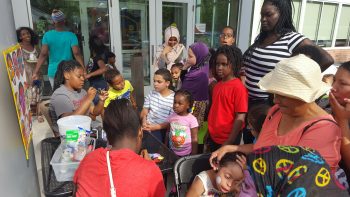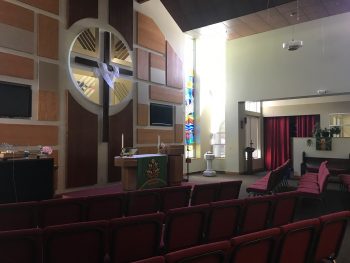By Emily Campbell
On the first Sunday of Advent in 2008, congregants filed out of Messiah Lutheran Church in South Minneapolis and continued to walk a block and half to Lutheran Social Service of Minnesota’s (LSS) Center for Changing Lives. Carrying the church’s altar candles and paraments with them, members of the congregation processed to the then-brand-new building where their church would be housed alongside a wide array of social service organizations. Almost ten years later, Messiah Lutheran Church has sold its old building to begin what Co-Pastor Tom Gustafson calls “a resurrection.”

Children are central to Messiah’s summer celebration in the Center for Changing Lives parking lot.
Pastor Gustafson elaborates, “The building is almost a hundred years old and the congregation is 110 years old. We’re standing on the shoulders of so many people and we’re standing on them to form a new chapter, a new way to be God’s people in the world.”
“Trying to keep up the building was really draining us of resources that could be put into ministry.”
Messiah’s former pastor and the former president of Lutheran Social Services (LSS) imagined the Center for Changing Lives as a base for social services and Messiah as the spiritual anchor of the ministry center. Messiah moved out of their original building in 2008 and has rented out the building for the last ten years. Over time, the resources to maintain the old building dwindled.
“Not only was it taking the financial assets from the congregation, It was taking the attention of our congregation leaders. Instead of thinking about the ministry, they were worried about heating and plumbing in the building,” Pastor Gustafson explains.
Pastor Louise Britts agrees: “Trying to keep up the building was really draining us of resources that could be put into ministry. So we made the choice as a congregation that people were more important than buildings.”
Messiah’s congregation was excited to support the decision to sell the building and the opportunities the sale could provide for their work with the community. But, the congregation still had to convince Minneapolis city government and a historic preservation committee of their belief that the ministry took precedence over the building in which it was once housed.
WHEN CHILDREN’S HOSPITAL, a neighboring institution on the same block as Messiah’s old building and the eventual buyer, first put an offer on the property in 2016, a historical preservation committee immediately put a moratorium on the sale and requested that Messiah renovate the building instead, a financial impossibility for the congregation. Every member of the preservation committee was white, though Messiah is centered in a racially diverse community that includes American Indians, Somali immigrants, and Latinx and African American families. To many in the congregation, it seemed that the committee was prioritizing the preservation of a Swedish heritage building over a ministry that built a solid foundation for often-marginalized youth.

The Messiah Lutheran sanctuary at the Center for Changing Lives
The day the moratorium on the building’s sale was lifted earlier this year, the congregation celebrated the ways in which they would be able to expand their community inreach. Pastor Britts recounts, “The congregation was supportive from the onset, even people with deep roots at Messiah. One person who was on the council had been a member of the congregation for a long time and her family had a long history of being in the neighborhood and in the congregation. But she said, ‘the building is old and it’s falling down and we need to see something new rise out of those ashes.’”
“Messiah’s congregation was excited to support the decision to sell the building and the opportunities the sale could provide for their work with the community.”
Messiah is still imagining its plans for sale’s proceeds. For now, they plan to tithe ten percent of the sale and put the rest in an account where it will earn interest while the congregation maps its future. A congregational retreat is planned for September when the congregation will ritualize the last piece of the grieving process for the old building and then start dreaming and creating for a new life moving forward. Pastor Britts states “We want to be really intentional with what we’ve gained. We want to be prayerful and discern what God is calling to do.”
Both pastors also see the sale as an opportunity for leadership development, allowing emerging leaders in the church to plan and dream for the ministry that they want to develop. “Our council looks like our congregation so that’s an exciting thing,” Pastor Britts highlights. “It took a while to get to that point so it’s important to start developing young leaders and people to pass the torch to and work with as we grow.”
MESSIAH’S LOCATION IN THE Center for Changing Lives has allowed for the development of unique ministry partnerships. “We’ve discovered this is a really great way to be church in the city. Previously someone would come in having trouble with their landlord or their employer and we’d have prayer with them and say ‘here’s a phone number, here’s somebody you can call,’” Pastor Gustafson describes, “And now we can say, ‘Oh, there’s a housing advocate on the second floor let’s go up and talk to them. Or there’s a whole bank of job computers if you’re looking for employment. There’s job advocates there. There’s an afterschool program here in the building and a tutor center in the building.’”
Other organizations in the building provide tutors for Messiah’s summer programming, nurses for its blood pressure clinic, a computer room and financial counseling for those seeking employment. Partner organizations also rely on Messiah for resources. “Just this morning, someone came from upstairs with a woman looking for a community so we talked and prayed and she’ll be here on Sunday,” Pastor Britts says.
“To many in the congregation, it seemed that the committee was prioritizing the preservation of a Swedish heritage building over a ministry that built a solid foundation for often-marginalized youth.”
“Our motto is ‘after the crisis, we’re here not to give handouts but to give people a hand up.’ We try to create circles of support so people can actually empower themselves to move from where they are to a different space,” she adds. “Someone from LSS can come down and say ‘we have this family who just arrived and they don’t have anything to eat’ and we have the food shelf so we can give bags of food and diapers and so the church becomes a place and space for resources. We have a lot of connections. We intersect with lots of different people from lots of different states of life.”
WHATEVER BUILDING IT IS IN, Messiah is deeply invested in its neighborhood. “We know our neighbors and our neighbors know us,” she explains. “They know us in crisis but they also know us just as people to say ‘hi’ to or to come in and have a cup of coffee. Once a month we do parking lot gigs, so we have open mic, and a DJ and artists, and it’s a neighborhood party and all our neighbors, regardless of race or religion, will come out. We go to the Neighborhood Association meetings and they know who we are. And there have been deaths in the community and they come to us for help and support. I think there’s a real, deep connection.”
“For years, Messiah is sinking their roots into the community where we are. Messiah’s here for the long haul whether we’re in that building, this one, or a new one. In this neighborhood, Messiah’s made a commitment to stand bastion,” Pastor Gustafson adds.
“We try to create circles of support so people can actually empower themselves to move from where they are to a different space.”
“It’s a community, but it’s also a community on the margins. There are people that have told me that sometimes they didn’t feel welcome in other churches but all are welcome here. We truly believe the spirit works and moves and we try to be really faithful to that gospel of allowing God to work within us. You find the Lord in the margins and those are the people we serve here,” Pastor Britts says.
Nearly ten years after their move to the Center for Changing Lives, Messiah’s congregation continues to grow and learn from its location. Pastor Gustafson states, “It was a confirmation lesson for us all that the church is the gathered people and the gathered people could be here or down at the park or wherever and the people are the church. And the building may be where we meet, but the people are the Church. And that was a good lesson for us all.”
UPDATE: The article has been updated to note that the eventual buyer of the building was Children’s Hospital.
